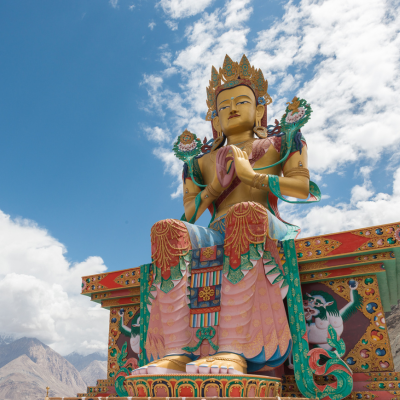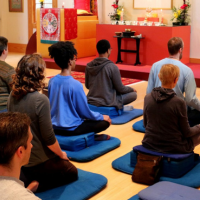Friday
Community ArticlesThe Next Buddha
A 10-month community initiative to support Shambhala in becoming a more inclusive, equitable, and socially aware culture.
Shambhala Online recently reached out to Denise Blanc, Frederick Meyer and Janet Ryvlin, facilitators of The Next Buddha, and asked them a few questions about the inspiration for the project, hopes of what the initiative will create, and why these topics are important when creating an enlightened society.
First off, what is The Next Buddha?
The Next Buddha is a 10-month community initiative to support Shambhala in becoming a more inclusive, equitable, and socially aware culture.
The sessions will include:
- Ten monthly interactive programs on topics that community members have identified as often being blind spots within Shambhala, taught by subject matter experts.
- Ten integration sessions—one per monthly topic—that provide a highly interactive opportunity to explore the content more deeply together.
- A library of resources, including reading lists, video and audio clips.
- Ongoing connection through the Shambhala Network.
- Programs on a variety of topics including, but not limited to: Belonging and Othering, Power and Power Dynamics, Systems of Inclusion and Oppression, Understanding White Privilege and White Conditioning, Mental Health and Trauma Sensitivity, Gender Dynamics and the Patriarch, and Ageism and Generational Diversity.
Our focus for all sessions is that they are not primarily lecture-based but highly experiential, and incorporate modalities of body, mind, and heart.
Where did you discover the inspiration for the formation of The Next Buddha?
The title comes from the following quote from the late Zen Master, Thich Nhat Hanh:
“It is possible the next Buddha will not take the form of an individual. The next Buddha may take the form of a community; a community practicing mindful living. And the practice can be carried out as a group, as a city, as a nation.”
We feel the following quote from Chögyam Trungpa Rinpoche expresses the same inspiration:
“It is up to each of us individually to find the meaning of enlightened society and how it can be realized.”
The project design is based on extensive feedback gathered from around the mandala, through surveys, interviews, and numerous community conversations.
We have chosen topics that have specifically been identified as blind spots within our Shambhala culture – blind spots that have interfered with our aspiration to be a healthy, inclusive, and welcoming community of practitioners.
We will explore these topics over 10 months, in a series of monthly gatherings. Each session will also include an optional Integration session two weeks after the program, which will be a fully interactive and deeper dive into the content.
All sessions will be two hours in length and held on Zoom. We will provide important, pithy material on each topic, but not an in-depth dive. We view these programs as an introduction, with the hope that participants will then choose to explore further in other classes and through their own personal inquiry.
In what areas do you hope to create more awareness with The Next Buddha sessions?
Within the sessions themselves, we hope to create a nurturing and supportive group container where we can begin to educate ourselves about the highly important topics mentioned earlier. We hope this will help us crack open solidified views, perspectives, and biases that have prevented Shambhala from being welcoming to all.
The view of basic goodness is our foundation to create an enlightened society. We believe that we need to educate ourselves, from the inside out, to achieve this aspiration. Our goal is to “be the change we want to see in the world,” by nurturing qualities such as inclusivity, embodiment, radical listening, and sensitivity to our differences.
We hope to build on much of the rich programming and initiatives that have blossomed throughout the mandala in the last several years. We understand that culture change is a long process, and we are not naïve in believing that these two-hour programs will suffice. Our intention is to begin the important process of “skilling up” for Shambhala to become an inclusive, welcoming space that creates a sense of belonging for all those who choose to enter.
Who is The Next Buddha for?
This program is open to anyone affiliated in Shambhala who wishes to learn and engage in co-creating this new culture.
Why is The Next Buddha important for the Shambhala community and how does it interweave with the Buddhadharma and the Shambhala teachings?
Returning to this quote from Shambhala: The Sacred Path of the Warrior:
“It is up to each of us individually to find the meaning of enlightened society and how it can be realized.”
Experience has clearly shown our community that, to create an enlightened society, we must open to the realities of one another’s lived experience. If we ignore or bypass forces like race, gender, or power dynamics in our interactions with one another, we can inadvertently cause harm, and we will find our community exclusionary without meaning to be.
Both our community and our broader world are thirsting for a place of real belonging for all—an enlightened society. Making this vision a reality will take work and stretching beyond our comfort zones, and with The Next Buddha we hope to contribute to this process.
From a Buddhist perspective, this project can be seen as an extension of loving-kindness and compassion practice: better seeing ourselves and others, and the details of our experiences, so that we can love more fully and be more effective in the world.
When and where are the gatherings held and how can folx find more information and register to participate?
We will offer marketing so that all those who are interested can attend. Shambhala Online will help in the marketing of this program. A link will be provided to learn more and register for the sessions very soon. In the meantime, folks may reach out to me, Frederick Meyer, directly to express interest or ask any questions at [email protected].







